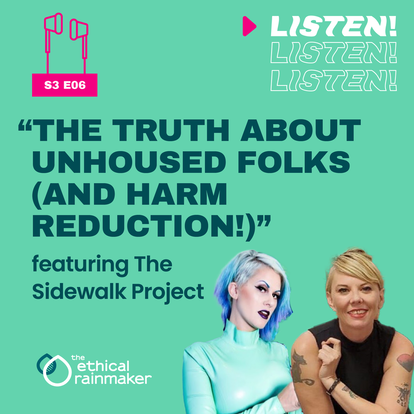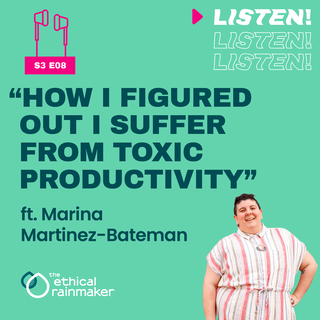|
Listen on:
Episode Summary:
Purity culture is a form of supremacy and oppression — controlling and dictating how people express themselves, causing anguish and keeping us from our best work. Michelle and Lorraine Nibut talk about large breasts, gun culture, our clothes, the sexualization of little girls, fetishization and consent violation ... basically the many ways purity culture holds us down — and what we can do to fight back against it!
Listen on:
Episode Summary:
Back by popular demand: "White Lady Wrangler," Fleur Larsen! Fleur joins Michelle to talk about white nonsense in the workplace, mean girls, martyrdom, tone policing, connection over correction, perfectionism, accountability and cringe-worthy behavior. We could have sector wide transformation if white women could center and hold a clear commitment to racial equity. So what does that look like? Fleur breaks down some nonsense with ownership and responsibility in four calls to action.
Listen on:
Episode Summary:
What's up with the controversies around Patagonia’s generosity? Fraud in Captain Tom’s household? BrewDog’s shock tactics and hypocrisy? Tokenism of Indigenous Tribes at Forterra? Michelle is discussing shock tactics, wealth hoarding, trust issues and more, with "The UK’s most influential fundraiser,” Andy King!
Listen on:
Episode Summary:
Traditional philanthropy has been asking nonprofits to jump through ridiculous and paternalistic hoops since its inception. But as movements like CCF require institutions to rethink how we do our work, we are not questioning our evaluation and metrics practices! In a world where tech money wants us to quantify our work, what is truly meaningful and how do we change!? Michelle talks with Marcia about Equitable Evaluation Framework and how our practices are so wrong and how to do better.
Listen on:
Episode Summary:
We throw shade and cause guilt and shame in social justice work all the time! But is finger pointing effective or does it just make us feel better to make someone else wrong? In this ep, Michelle talks with author of an Oprah-loved book (Beyond Guilt Trips) Anu Taranath, as they build analysis through a lens of travel ethics and what it means to truly move forward.
Listen on:
Episode Summary:
Nonprofits and Foundations engage in power play all the time but this kinky practice in the third sector is rarely consensual. In this rewind episode, Michelle discusses negotiation and consent practices with L.T. a radical pleasure based sex educator! Cum explore this Rewind!
Listen on:
Episode Summary:
Big money is thrown around when it comes to impact investing, but are these ‘incubators for social impact projects’ and ‘five-star conferences’ actually doing anything other than stroking egos? In this ep, Michelle and The Osborne Group’s Bob Osborne discuss their experiences and analysis!
Listen on:
Episode Summary:
Nobody quit for 2 years. That’s the kind of culture that Rickesh Lakhani and his teammates at Future Possibilities for kids in Toronto, Ontario, were able to build. Michelle sits with Rickesh to discuss what it takes to build a beautiful workplace culture.
Listen on:
Episode Summary:
For the 2-year anniversary of the Ethical Rainmaker and Community-Centric Fundraising (CCF), Michelle sits with Rachel D’Souza Siebert and Henry Ramos to discuss where CCF is at today … and why it’s making itself at home because it’s here to stay. Episode Notes This episode includes Henry Ramos, Rachel D’Souza-Siebert and Michelle Shireen Muri! Check out some of their work below:
About our sponsor: Neon One With Neon One, you can take a modern approach to donor engagement and easily stay connected with your constituents. In today’s environment, managing donors, members, volunteers, fundraising and grants, should happen in a unified, secure platform. See how Neon One enables nonprofits to leave the spreadsheets and outdated databases behind, with an all-in-one platform. Visit neonone.com/michelle. Generosity Xchange is happening October 19 - 20 and you don't want to miss it. It's a two-day virtual event where nonprofit professionals and ideas meet. Get your free ticket today.
Listen on:
Episode Summary:
In the third episode of our Drizzle Miniseries, our Ethical Rainmaker host Michelle talks with Stacy about the emotions that can sabotage us when working with money! They discuss the impact of our personal narratives on how we run nonprofits and themes around shame, building analysis, fundraising and families of origin.
Listen on:
Episode Summary:
In the second episode of our Drizzle Miniseries, our Ethical Rainmaker host Michelle shares the three biggest mistakes she made as an in-house fundraiser, including themes on event extortion, process predicaments and burn out blessings.
Listen on:
Episode Summary:
In this inaugural episode of our Drizzle miniseries, the Ethical Rainmaker host Michelle shares her origin story, (with chapters that include bullying, Classical music, the CIA, fate, therapy, and more!) S3 Episode 10: The truth about cancel culture (and an alternative approach), featuring Kevin Baker3/29/2022
Listen on:
Episode Summary:
Cancel culture. Disbanded groups. Severed ties. Intent vs Impact. Most of us are shit at dealing with problematic behavior - our own or others! Whether in our nonprofits, our neighborhood groups, activist communities or families - our unresolved conflicts cause damage, chaos and separation - in times where we need unity, repair and one-ness to best serve our communities. Enter Kevin Baker whose mission is to make sure people can bring their authentic cultural selves to the workplace, creating healthier, more open workspaces that better serve humans. Kevin and I talk about how a whole bunch of us really need therapy, what it means to take a relationship-first approach to workplace conflict, and why we need to ditch our desire for quick fixes and allow ample time for repair work. S3 Episode 9: The truth about unhoused folks (and harm reduction!) ft. The Sidewalk Project3/16/2022
Listen on: Medical violence. Stigmatization. Criminalization. These are just a portion of the harms we, as nonprofits, cause the people we are supposed to serve. That’s why Soma Snakeoil and Stacey Dee created The Sidewalk Project, an organization that advocates for the dignity and rights of people living on the streets. Everyone deserves to be treated with respect, have their needs met, and receive medical care, but our unhoused neighbors are often denied even the most basic compassion and dignity. Learn about some of the shitty practices we perpetuate and how we can instead empower communities that have been systematically harmed and erased
S3 Episode 8: "How I Figured Out I Suffer From Toxic Productivity," ft. Marina Martinez-Bateman3/1/2022
S3 Episode 7: "Why honesty is my favorite form of poetry" featuring Matthew Cuban Hernandez2/16/2022
Listen on:
Episode Summary:
Honesty. We crave it and we don’t get enough of it! In this episode, award winning poet, hip hop artist and teacher Matthew Cuban Hernandez of Street Poets Inc. (LA) talks with Michelle about honesty in our interpersonal relationships and in our organizations, rites of passage, structural racism and ageism in working with young people and…giving work away!
Listen on:
Episode Summary:
International comedienne, performance artist, actress and elected official Kristina Wong, talks about the subversive game, the performance of her lifetime (elected office) and her journey as an accidental sweatshop overlord through her latest mutual aid project and book The Auntie Sewing Squad. Based in LA, California learn about the connection between art, organizing and radical politics.
Listen on:
Episode Summary:
When community-centric fundraising launched their content hub and 10 principles, thousands of organizations and people took note - and many took action. Lea Whitehurst-Gibson and Bekah Kendrick of Virginia Community Voice talk about how they built and delivered their Courageous Fundraising Principles and how they center community in their work based in Richmond, Virginia, the former capital of the Confederacy. Learn about strategy and tactics in this story!
Listen on:
Episode Summary:
TV celeb and James Beard Award-winning chef, Tomme Beevas talks about how the lynching of George Floyd - less than two miles from his restaurant, played out in the creation of Pimento Relief Services, a truly community-centered organization in Minneapolis, Minnesota. Learn about liberation in action through this inspiring story!
Listen on:
Episode Summary:
How can love be a metric and what does it look like to measure that instead of fundraising goals? The Oregon food bank surprised many folks in the nonprofit community when they revealed a new concept, measuring love instead of fundraising. In this episode, Nathan Harris and Vivien Trinh of the Oregon Food Bank, describe the thinking and process around how they changed the practices of the Oregon Food Bank to center love! |



